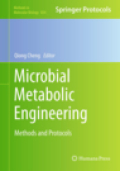
Metabolic engineering is the practice of genetically optimizing metabolic andregulatory networks within cells to increase production and/or recovery of certain substance from cells. In Microbial Metabolic Engineering: Methods and Protocols expert researchers in the field detail many of the methods which are now commonly used to study metabolic engineering. These include methods and techniques to engineer genes and pathways, use of modern biotechnology tools in microbial metabolic engineering, and examples of metabolic engineering for realworld applications such as whole cell biosensors and acetate control in largescale fermentation. Written in the highly successful Methods in Molecular Biology™ series format, chapters include introductions to their respective topics, lists of the necessary materials and reagents, step-by-step, readily reproducible laboratory protocols, and key tips on troubleshooting and avoiding knownpitfalls. Authoritative and practical, Microbial Metabolic Engineering: Methods and Protocols seeks to provide researchers with an overview of key topics on microbial metabolic engineering. Strategies and techniques of metabolic engineering within the scope of microbial applications mainly focused on bacteria and yeasts. Provides step-by-step detail essential for reproducible results. Contains key notes and implementation advice from the experts. INDICE: Screening for Cellulases with Industrial Value and their use in Biomass Conversion.- Reversal of NAD(P)H Cofactor Dependence by Protein Engineering.- Quantifying Plasmid Copy Number to Investigate Plasmid Dosage Effects Associated with Directed Protein Evolution.- High Isoprenoid Flux Escherichia coli as a Host for Carotenoids Production.- Mutagenic Inverted Repeats Assisted Genome Engineering (MIRAGE) in Saccharomyces cerevisiae : Deletion of gal7. Creation of New Metabolic Pathways or Improvement of Existing Metabolic Enzymes by in vivo Evolution in Escherichia coli. Bioluminescent Reporter Genes for Promoter Discovery.-Recombination-based DNA Assembly and Mutagenesis Methods for Metabolic Engineering.- Ethanol-tolerant Gene Identification in Clostridium thermocellum using Pyro-resequencing for Metabolic Engineering.-Use of Proteomic Tools in Microbial Engineering for Biofuel Production.-Metabolic Engineering of Antibiotic-producing Actinomycetes using in vitro Transposon Mutagenesis.-Use FACS Sorting in Metabolic Engineering of Escherichia coli for Increased Peptide Production.-Using Flux Balance Analysis to Guide Microbial Metabolic Engineering. Using an Advanced Microfermentor System for Strain Screening and Fermentation Optimization.-Rapid Strain Evaluation using Dynamic DO-stat fed-batch Fermentation Under Scale-down Conditions.- Preparation and Evaluation of Lignocellulosic Biomass Hydrolysates for Growth by Ethanolgenic Yeasts.-Engineering Whole-cell Biosensors with No Antibiotic Markers for Monitoring Aromatic Compounds in the Environment.-Metabolic Engineering for Acetate Control in Large Scale Fermentation.-Minimization and Prevention of Phage Infections in Bioprocesses. . . . . .
- ISBN: 978-1-61779-482-7
- Editorial: Humana Press
- Encuadernacion: Cartoné
- Páginas: 362
- Fecha Publicación: 28/01/2012
- Nº Volúmenes: 1
- Idioma: Inglés
